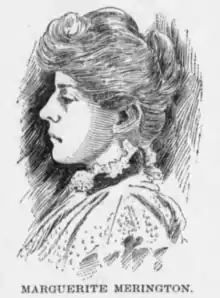Marguerite Merington
Marguerite Merington[lower-alpha 1] (1857/60/61 – May 20, 1951) was an English-born American author of short stories, essays, dramatic works, and biographies.[1] For several years, she taught in Greek and Latin at the Normal College in New York before pursuing a career as an author.
Marguerite Merington | |
|---|---|
 Newspaper drawing of Merington | |
| Born | 1857/60/61 Stoke Newington, England |
| Died | (aged 94) New York City |
| Occupation | Author |
| Language | English |
Early life and education
Marguerite Merington was born in Stoke Newington,[2] England, in 1857,[3] 1860,[2] or ca. 1861.[1]
At an early age, she came with her parents to Buffalo, New York where was educated at a convent. Even as a girl, she displayed dramatic talent, and often wrote and acted little parlor plays.[4]
Career
For several years, she was instructor in Greek and Latin in the Normal College in New York. After resigning from this position, Merington pursued the career of a dramatic author. About 1889, E. H. Sothern proposed that Merington should write him a play, the leading character of which should be a captivating Irish gentleman. With a few suggestions from him, the play, Captain Lettarblair was written. Before it was performed, Joseph Jefferson, saw the manuscript and praised it highly. The play had a trial run at an authors' matinee in New York City, and was first presented August 16, 1892, at the Lyceum Theatre. Captain Lettarblair, produced by Daniel Frohman,[2] brought in large audiences, was financially successful, and held a place in Sothern's repertoire.
Merington wrote other dramas, including Good-Bye, A Lover's Knot, and the libretto of a comic opera, Daphne, or the Pipes of Arcadia. Set to music by Arthur Bird, of London, it gained the prize of US$500 from the New York Conservatory of Music.[4] After having served as the private secretary of Elizabeth Bacon Custer, Merington became the editor of The Custer Story: The Life and Intimate Letters of General George A. Custer and His Wife Elizabeth.[5]
Death
Merington died on May 20, 1951, in her Manhattan home.[6] Of her life she said: "There is absolutely nothing about me to be told, and that I never tell."[4]
Selected works
- At parting; comedy ...
- The Children's Garden : given in the name of Frances Hodgson Burnett.
- Kindly light; a modern morality play ...
- One life to give; drama in verse founded on the story of Nathan Hale ...
- An everyday man; comedy ...
- Love Finds the Way
- The island; a drama ...
- That little shabby gentleman; comedy ...
- The court of Ferrara; a dialogue ...
- Pepilia; comedy ...
- "Good-bye!" A story of love and sacrifice ...
- The musical isle ...
- The key to the house; play ...
- Drum and fife parade ...
- "Captain Lettarblair"; a drama in three acts
- Old orchard ... called Rose Valley in Chicago Production.
- Daphne, or, The pipes of Arcadia : three acts of singing nonesense , 1896
- The right ending : one-act sketch in blank verse for three persons, two men and one woman--, 19??
- Late Dyal & Co.; a farce-comedy in three acts., 19??
- Cranford; a play; a comedy in three acts made from Mrs. Gaskell's famous story., 1905
- The turn of the tide : a play in four acts, 1905
- The lady in the adjoining room : one-act play, 1905
- Snow-white : a play for children , 1905
- The Gibson play a two-act comedy based on Mr. Charles Dana Gibson's series of cartoons "A widow and her friends" originally printed in "Life,", 1901
- Scarlett of the Mounted ... Illustrated., 1906
- Picture plays, 1911
- More fairy tale plays, 1917
- Fairy tale plays, 1925
- Story of the Custer massacre, now fifty years past, is retold by widow of famous Indian fighter , 1926
- A Dish o' Tea Delayed. One-act play for high school girls, etc., 1937
- Edwin Booth; sketch for a cinema; sequence of scenes and dialogue,, 194?
- Booth episodes; play in eight episodes, nine scenes, founded on the life of Edwin Booth. , 1944
- The Custer story : the life and intimate letters of General George A. Custer and his wife Elizabeth, 1950
Notes
- The surname was sometimes misspelled as 'Merrington' in news reports.
References
- "Marguerite Merington papers". New York Public Library. Retrieved 6 May 2018.
- Fisher & Londré 2017, p. 451.
- "Merington, Marguerite, 1857–1951". VIAF. Retrieved 6 May 2018.
- Siegel-Cooper 1899, p. 23.
- Dippie 1994, p. 183.
- "Marguerite Merington". The Boston Globe. 21 May 1951. p. 7 – via Newspapers.com.
Attribution
 This article incorporates text from this source, which is in the public domain: Siegel-Cooper (1899). "American Women Play-Wrights, by Esther Singleton". Book Notes: A Monthly Literary Magazine and Review of New Books (Public domain ed.). Siegel-Cooper.
This article incorporates text from this source, which is in the public domain: Siegel-Cooper (1899). "American Women Play-Wrights, by Esther Singleton". Book Notes: A Monthly Literary Magazine and Review of New Books (Public domain ed.). Siegel-Cooper.
Bibliography
- Dippie, Brian W. (1994). Custer's Last Stand: The Anatomy of an American Myth. University of Nebraska Press. p. 183. ISBN 0-8032-6592-1.
- Fisher, James; Londré, Felicia Hardison (22 November 2017). Historical Dictionary of American Theater: Modernism. Rowman & Littlefield Publishers. ISBN 978-1-5381-0786-7.